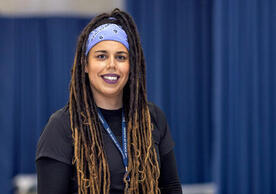
By Mallory Locklear
Christine Rodriguez is dedicated to health care. She teaches clinical skills at the Yale School of Nursing (YSN) and provides transgender care to patients. An accomplished rapper, she even turned down a career in music to pursue one in nursing. She loves hanging out with her kids, listening to reggae, and collecting or creating art. Her favorite book is “The Art of War.”
We caught up with her for the latest edition of Office Hours, a Q&A series that introduces Yale newcomers to the broader university community.
Title: Lecturer in Nursing & Director of Simulation Unit
Research Interest: Simulation-based education, transgender care, and the use of cannabis as medical treatment
Prior Institution: University of Saint Joseph
Started at Yale: May 24, 2021
What are some of your research interests?
Christine Rodriguez: I have a lot of interests that span different areas, but I think the biggest ones are rooted in diversity, equity, and inclusion. I have a huge focus on simulation-based education. That’s my role at YSN — helping students understand how to do clinical skills with manikins [human-shaped models used to simulate medical procedures]. I also have a huge focus on transgender care, which is what I do as my faculty practice, seeing patients and supplying gender-affirming hormones. I also work with cannabis, studying cannabinoid receptors and how they work in the body, and seeing what we can do to heal people with alternative regimens.
Why is simulation such a useful tool in nursing education?
Rodriguez: Simulation provides a safe environment where students can enhance their clinical skills. They’re allowed to make the decisions and they’re able to make mistakes.
We create scenarios that are meant to be realistic. So, we make the room look like a hospital and have the manikin dressed to look like a patient. We also have skills labs, and in those sessions we teach students how to conduct different skills, like how to listen to the heart, where to put the stethoscope to hear the lungs, and how to assess breathing.
You have master’s degrees in theological studies and divinity — how does theology intersect with your work?
Rodriguez: One way is that some patients recognize my degrees and ask if they can talk to me about their beliefs and their health. And to me, that’s the beauty of it, that intersection, to be able to talk to them about what spirituality and religiosity looks like for them and how it benefits their health or how to integrate it into their care.
It also played a huge role when I was a hospice and an oncology chaplain. Having that nursing background allowed me to understand what was going on in the medical unit. And having that background as a seminarian allowed me to understand the needs of the patients on another level.
You mentioned you’re an art creator and collector. Do you have a favorite piece of art in your glass art collection?
Rodriguez: I love marbles created with borosilicate glass. I have one that’s a galaxy inside a marble. It’s from an artist in Serbia. It’s a really, really cool piece.
And what about your own art?
Rodriguez: I create poetry, which is really fun. I used to do a lot of spoken poetry when I was younger. I also almost got signed to music deals twice. The first was when I was 14 or 15, and my parents said I was too young for it at the time. The second was right before I got accepted to nursing school and I decided nursing school was more important.
This piece was originally published in Yale News.
